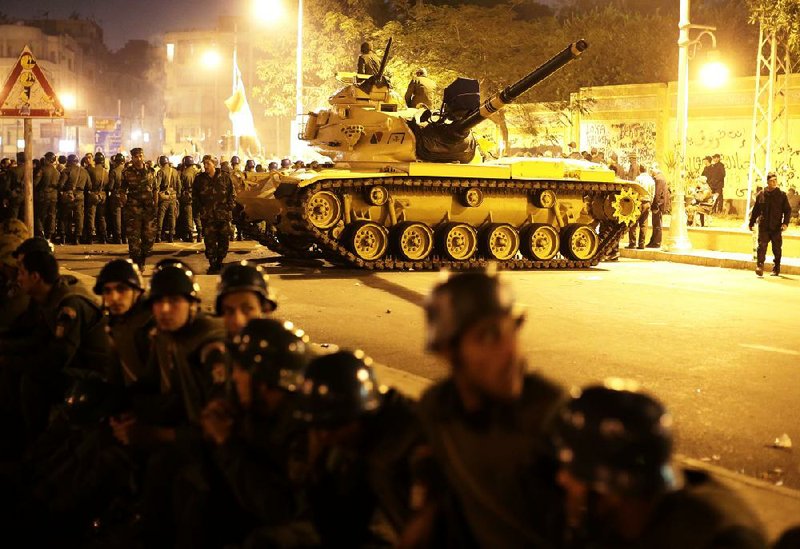INTERACTIVE
CAIRO — Egypt’s judges on Tuesday said most of them would not oversee a nationwide referendum on a contentious draft constitution, as tens of thousands of opponents and supporters of the country’s Islamist president staged rival rallies in Cairo, four days ahead of the vote.
The demonstrations and judges’ boycott came hours after masked assailants set upon opposition protesters staging a sit-in at Tahrir Square, firing birdshot and swinging knives and sticks, according to security officials. They later said that five “hardened criminals” were arrested in connection with the attack.
Eleven protesters were wounded, the MENA state news agency said, citing a Health Ministry spokesman.
The violence served as a stark reminder of the stakes in Egypt’s political battle over the disputed draft constitution, which goes to a nationwide referendum Saturday. The charter has deeply polarized the nation and triggered some of the worst street violence since Mohammed Morsi took office in June as Egypt’s first freely elected president.
On one side of the divide, there is Morsi, his Muslim Brotherhood and ultraorthodox Salafis, while on the other side there is a collection of liberals, leftists and Christians who claim the draft charter restricts freedoms and gives Islamists vast influence over the running of the country.
With tensions running high, the military appeared to insert itself into the fray when MENA reported that Defense Minister Abdel-Fatah el-Sissi had called for talks today to discuss how to resolve the crisis.
But the agency then quickly ran a second report quoting an unnamed armed forces spokesman who denied that el-Sissi had called for dialogue.
Later, the official Facebook page of the armed forces spokesman said el-Sissi was in fact extending an “invitation to the Egyptian family from all segments of the population during which no national dialogue will take place.”
Whatever the nature of the invitation, it is the second time this week that the military has addressed the crisis, signaling its return to the political fray after handing over power in June to Morsi. Earlier this week, it warned of disastrous consequences if the crisis over the country’s draft constitution is not resolved.
Ahmed el-Zind, the chairman of the Judges’ Club, said Tuesday that 90 percent of the nation’s judges would not oversee the Saturday vote.
Morsi’s deputy, Mahmoud Mekki, has said that if there are not enough judges to oversee the referendum, the vote can be staggered over several days. A faction of judges loyal to Morsi has said it would not boycott the vote.
In Cairo’s Nasr City district, a Muslim Brotherhood stronghold, tens of thousands of the president’s backers, some of them waving Egyptian flags, voiced their support Tuesday for the constitution in a rally in front of a local mosque.
The crowd grew rapidly as dozens of buses, most of them bearing license plate numbers from provinces outside of Cairo, offloaded thousands of Morsi supporters at the venue.
The crowd denounced the liberal opposition and its leaders, calling them undemocratic and accusing them of being loyalists of Hosni Mubarak, the authoritarian leader who was ousted in a popular uprising last year.
Several hundred Islamists also have set up camp across town outside a media complex that is home to several independent TV networks critical of Morsi and the Brotherhood. The Islamists have threatened to storm the facility.
The opposition staged its rally in the nearby Heliopolis neighborhood, where tens of thousands of protesters gathered outside the presidential palace, pushing their demands that Morsi scrap the referendum.
“The people want the downfall of Brotherhood rule,” the protesters chanted, alluding to the widespread notion that Mohammed Badie, the spiritual leader of the Muslim Brotherhood, is the country’s actual ruler.
Troops belonging to the elite Republican Guards deployed outside the palace did not intervene.
Egypt’s political crisis began Nov. 22 when Morsi issued a decree granting himself — and the Islamist-dominated panel writing the constitution — immunity from judicial oversight or challenge. Those decrees sparked mass demonstrations, with opponents saying they were issued initially to protect the draft charter from the judiciary.
The constituent assembly then hurriedly approved the draft constitution in a marathon overnight session, prompting hundreds of thousands of the president’s opponents to rally in the streets — the largest from primarily secular groups since the rebellion that toppled Mubarak last year.
Morsi’s supporters responded with huge demonstrations of their own, which led to clashes in the streets that left at least six people dead and hundreds wounded.
The violence then rippled across the country, with at least two dozen attacks on offices of Morsi’s Muslim Brotherhood, according to the group’s leaders. Meanwhile, senior opposition figures, including former lawmakers, have been badly beaten by pro-Morsi Islamists.
Morsi has since rescinded the decree that gave him absolute powers, but did not meet the opposition’s main demand and delay the referendum.
Information for this article was contributed by Sarah El Deeb of The Associated Press.
Front Section, Pages 2 on 12/12/2012
